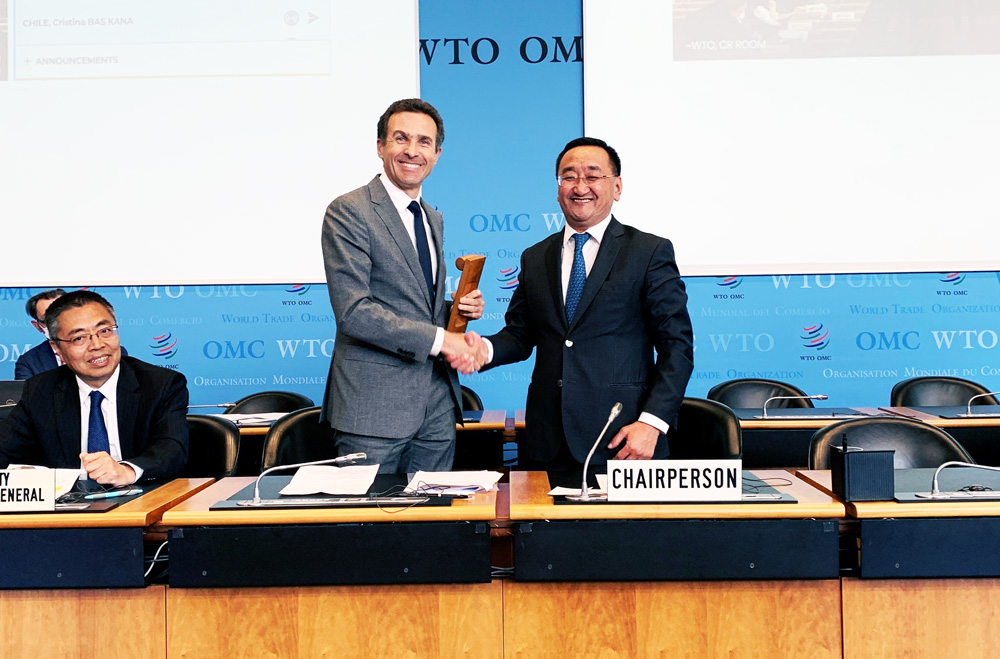COUNCIL FOR TRADE IN GOODS
More
Trade concerns
The Council heard 41 trade concerns on measures maintained or newly introduced by 25 WTO members, which included 11 new issues. These concerns were raised over a wide range of measures, including tariffs and tariff rate quotas, import and export bans and restrictions, technical barriers to trade, sanitary and phytosanitary measures, alleged discriminatory domestic taxation, domestic content requirements, import licensing requirements and countervailing duties.
The measures encompass a wide range of sectors (e.g. agricultural, information technology, fisheries, forestry and food products) as well as specific products, such as air conditioners, apples, cheese, cosmetics, energy drinks, instant coffee, mobile phones, pears, plain copier paper, pulses, tyres and steel. The full agenda of the meeting, including the list of trade concerns discussed, is available here.
Many members took the floor to express their strong opposition to the invasion of Ukraine. The Russian Federation responded by saying that the WTO was not the proper venue for a discussion of this nature and expressing concern over the restrictive measures introduced by several members on Russian products and sectors in response to the conflict. These members noted those measures would not have been introduced if Russia had not invaded Ukraine.
Transparency and notifications
Members welcomed the report by the WTO Secretariat in document G/L/223/Rev.29, which contains the status of notifications under the provisions of WTO agreements in Annex 1A of the WTO Agreement. The document's latest revision updates the information on the notifications submitted by members up to 31 December 2021.
Members considered the document very informative and thanked the Secretariat for the update. Some members expressed concern about the lack of improvement in notifications compliance across agreements since the report's previous revision. They further noted that the challenge of incomplete and missing notifications was not limited to members of a particular region or grouping, but widespread, despite the availability of Secretariat assistance and training opportunities.
Members reiterated that addressing the operation and effectiveness of current notification practices, as recommended in the proposal on transparency and notification procedures, would be a practical means of making progress on these issues with a view to strengthening the WTO's performance in this area.
The chair, Ambassador Lundeg Purevsuren of Mongolia, drew members' attention to the Beta version of the Notifications Portal, available in notifications.wto.org, which was released by the Secretariat at the beginning of this year for members' review. The portal seeks to consolidate, under a single system, all general information concerning notifications and the information for the agreements on trade in goods summarized and presented following the template of document G/L/223/Rev.29.
Proposal on graduated LDCs
Members discussed again the LDC Group proposal on measures to allow graduated LDCs with a gross national product (GNP) below USD 1,000 to be granted benefits pursuant to the provision of Article 27.2 of the Agreement on Subsidies and Countervailing Measures, i.e. exemption from the provision on export subsidies (WT/GC/W/742-G/C/W/752).
On behalf of the LDC Group, Chad said that an agreement on this decision would make an important contribution to remedying the difficult circumstances that graduating LDCs were encountering, particularly as a result of the COVID-19 pandemic and the conflict in Ukraine. It would also contribute to the further integration of LDCs in the multilateral trading system.
Some developed country members acknowledged the challenges that LDC members were facing as a result of two consecutive and overlapping global crises but also noted gaps remaining in the information that is needed for this proposal to be workable from a technical perspective. Nevertheless, they stood ready to consider ideas and proposals with the LDC Group as to how to address those gaps.
Subsidiary bodies
The Council was not able to reach a consensus on a slate of names for its subsidiary bodies. Members agreed to suspend this agenda item and to reconvene the Council as soon as a slate of names was ready for its consideration.
New chair
At the end of the meeting, the Council elected Ambassador Etienne Oudot de Dainville of France as its new chair for 2022, and thanked Ambassador Lundeg Purevsuren of Mongolia for his service as chair for 2021.
Next meeting
The next meeting of the Council for Trade in Goods is scheduled for 7-8 July 2022.
Share
Share

Handover of the gavel between the outgoing chair, Ambassador Lundeg Purevsuren of Mongolia, and the newly elected chair, Ambassador Etienne Oudot de Dainville of France.
Problems viewing this page? If so, please contact [email protected] giving details of the operating system and web browser you are using.